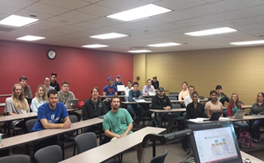Students in a supply chain strategy class are recommending changes in the way workers get paid to help smooth peaks and valleys in shopper demand and improve the U.S. economy.
The class, taught by John Kent of the Supply Chain Management Department of the Sam M. Walton College of Business at the University of Arkansas, partnered with Walmart, Tyson Foods, and Procter & Gamble to look at ways of improving the flow of goods in the supply chains connecting these companies.
One of several innovative student recommendations was to work with the U.S Department of Treasury and the largest private employers in the United States to smooth consumer demand by changing payroll practices to disperse money daily, instead of in the traditional payrolls monthly or every other week.
Last names beginning with A would be paid on the 1st of the month, B paid on the 2nd, C paid on the 3rd, etc. The students suggested this approach could smooth demand spikes at the point-of-sale for many of staple items studied such as chicken, bacon, diapers and paper towels. Additionally, this approach should reduce spikes identified upstream in the supply chain for demand of trucks delivering between production facilities and distribution centers in a constrained transportation market. This payroll change would improve the economy by lowering inventory spikes and decreasing peak spot market truck prices, two primary components of logistics cost.
"Experiential learning helps teach and reinforce critical thinking, presentation and technical skills by exposing students to current supply chain issues while providing the firms who recruit our students an opportunity to see them in action," said Kent, a clinical assistant professor in the Walton College.
The project was designed so that students could learn how manufacturers and retailers manage their supply chains and so that they would propose innovative ideas to improve the flow of products from production to the retail distribution centers, given tight capacity in truck, rail and west coast port transportation systems.`
In addition to tours of Walmart and Tyson Foods distribution centers, students learned technical skills by using software such as Visio, Tableau and Excel, which provided visual representations of data provided by the companies. The software allowed students to visualize the impact on product flows created by the U.S. economy's decades old monthly, weekly or biweekly payroll and supplemental government payment programs.
Other recommendations made by the students included routing changes for import shipments from the west coast to gulf and east coast ports, working with railroads to better utilize portions of their infrastructure, 3D print manufacturing, mobile phone dashboards and distribution center automation. Throughout the semester and during their final presentation at the Walmart home office students had the opportunity to learn from several executives in each company.
"The realistic scenarios we were exposed to as students throughout this project go far beyond classroom limits," student Jonathan Garcia Townsend said. "I envision the partnership with these companies will continue to offer innovative learning experiences for Walton College students that will be applicable and prepare us for future careers."
Contacts
David Speer, director of communications
Sam M. Walton College of Business
479-575-2539,
